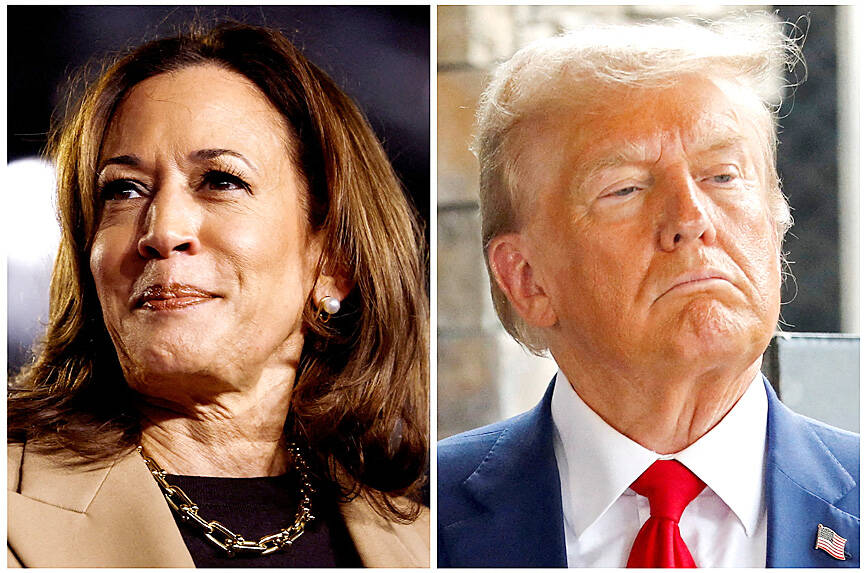Top Taiwanese officials yesterday moved to ease concern about the potential fallout of Donald Trump’s return to the White House, making a case that the technology restrictions promised by the former US president against China would outweigh the risks to the island.
The prospect of Trump’s victory in this week’s election is a worry for Taipei given the Republican nominee in the past cast doubt over the US commitment to defend it from Beijing. But other policies championed by Trump toward China hold some appeal for Taiwan.
National Development Council Minister Paul Liu (劉鏡清) described the proposed technology curbs as potentially having “more pros than cons” for Taiwan. Such restrictions are likely to prompt more Taiwanese companies to shift production back from China and redirect export orders to local manufacturers, he said.

Photo: Reuters
When asked by a lawmaker yesterday about Taiwan’s preparations for the US election results, Liu said that while the island might also face a 10 percent tariff on its goods, “the impact would be limited, as most suppliers in Taiwan are primarily doing contract manufacturing serving the US clients.”
A Trump victory could make a bigger difference for Taiwan than a win by US Vice President Kamala Harris, according to Liu, though he said Taiwan is prepared for various outcomes.
Responding to lawmaker questioning, Minister of Economic Affairs J.W. Kuo (郭智輝) said he expected Harris would likely continue the Democratic Party’s policies on Taiwan.
Kuo acknowledged that Trump could introduce measures that might prove harmful for Taiwan’s semiconductor industry. But Taiwan “will have strategies in place to respond, and the impact will not be as severe as some anticipate,” he said.
China claims the self-governing democracy is its territory, and has threatened to seize the island by force if needed. US President Joe Biden has repeatedly vowed to defend Taiwan in the event of an “unprecedented attack.”
In an interview with CBS News’s “60 Minutes,” Harris hewed closer to the traditional US policy of “strategic ambiguity” while saying it’s important to help Taiwan defend itself.
Trump has been less supportive, telling Bloomberg Businessweek earlier this year that Taiwan stole the US’s chip business. He also called for the island to pay more for defense and noted the challenges of defending it from Beijing. “Taiwan is 9,500 miles away,” Trump said. “It’s 68 miles away from China.”
In a subsequent interview with Bloomberg editor-in-chief John Micklethwait last month, Trump didn’t answer directly when asked if American troops would defend Taiwan if China invaded.

Taiwan will prioritize the development of silicon photonics by taking advantage of its strength in the semiconductor industry to build another shield to protect the local economy, National Development Council (NDC) Minister Paul Liu (劉鏡清) said yesterday. Speaking at a meeting of the legislature’s Economics Committee, Liu said Taiwan already has the artificial intelligence (AI) industry as a shield, after the semiconductor industry, to safeguard the country, and is looking at new unique fields to build more economic shields. While Taiwan will further strengthen its existing shields, over the longer term, the country is determined to focus on such potential segments as

UNCERTAINTY: Innolux activated a stringent supply chain management mechanism, as it did during the COVID-19 pandemic, to ensure optimal inventory levels for customers Flat-panel display makers AUO Corp (友達) and Innolux Corp (群創) yesterday said that about 12 to 20 percent of their display business is at risk of potential US tariffs and that they would relocate production or shipment destinations to mitigate the levies’ effects. US tariffs would have a direct impact of US$200 million on AUO’s revenue, company chairman Paul Peng (彭雙浪) told reporters on the sidelines of the Touch Taiwan trade show in Taipei yesterday. That would make up about 12 percent of the company’s overall revenue. To cope with the tariff uncertainty, AUO plans to allocate its production to manufacturing facilities in

COLLABORATION: Given Taiwan’s key position in global supply chains, the US firm is discussing strategies with local partners and clients to deal with global uncertainties Advanced Micro Devices Inc (AMD) yesterday said it is meeting with local ecosystem partners, including Taiwan Semiconductor Manufacturing Co (TSMC, 台積電), to discuss strategies, including long-term manufacturing, to navigate uncertainties such as US tariffs, as Taiwan occupies an important position in global supply chains. AMD chief executive officer Lisa Su (蘇姿丰) told reporters that Taiwan is an important part of the chip designer’s ecosystem and she is discussing with partners and customers in Taiwan to forge strong collaborations on different areas during this critical period. AMD has just become the first artificial-intelligence (AI) server chip customer of TSMC to utilize its advanced

Chizuko Kimura has become the first female sushi chef in the world to win a Michelin star, fulfilling a promise she made to her dying husband to continue his legacy. The 54-year-old Japanese chef regained the Michelin star her late husband, Shunei Kimura, won three years ago for their Sushi Shunei restaurant in Paris. For Shunei Kimura, the star was a dream come true. However, the joy was short-lived. He died from cancer just three months later in June 2022. He was 65. The following year, the restaurant in the heart of Montmartre lost its star rating. Chizuko Kimura insisted that the new star is still down